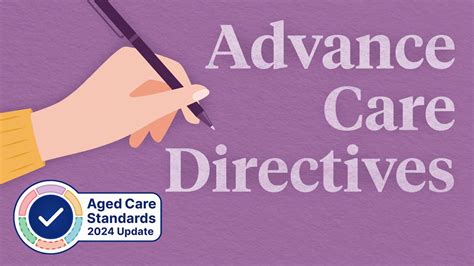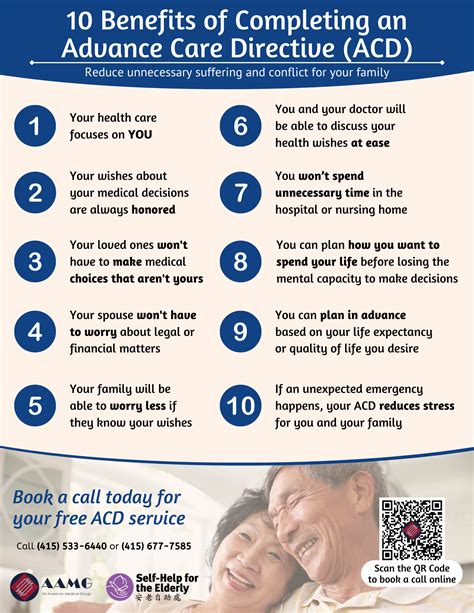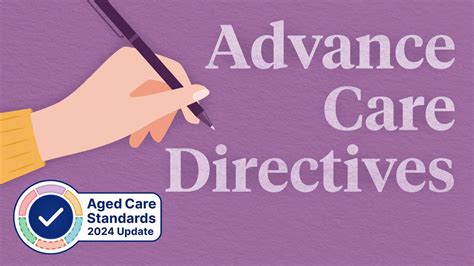Intro
Discover the 5 ways an Advance Care Directive benefits end-of-life care, including living wills, healthcare proxies, and medical power of attorney, ensuring personalized medical decisions and preferences are respected.
The importance of planning for the future, especially when it comes to healthcare, cannot be overstated. As individuals, we all have unique preferences and values that guide our decisions, and these should be respected even when we are no longer able to communicate them ourselves. One powerful tool that allows us to ensure our wishes are honored, even in the face of incapacitation, is the Advance Care Directive (ACD). An ACD is a document that outlines a person's preferences for their medical treatment in the event they become unable to make decisions for themselves. It's a way to take control of one's healthcare future, ensuring that one's autonomy and dignity are preserved.
Planning for future healthcare needs can seem daunting, but it's a crucial step in ensuring that one's values and preferences are respected. An Advance Care Directive is not just about end-of-life care; it's about living with dignity and autonomy, regardless of one's health status. By completing an ACD, individuals can communicate their wishes regarding medical treatments, including those they do and do not want, to their healthcare providers and loved ones. This not only provides peace of mind but also reduces the burden on family members and friends who might otherwise have to make difficult decisions without clear guidance.
Understanding the components and benefits of an Advance Care Directive is essential for making informed decisions about one's healthcare. An ACD typically includes several key elements, such as the appointment of a healthcare proxy (someone who will make decisions on one's behalf), specific instructions for end-of-life care, and other medical treatment preferences. By considering these aspects, individuals can tailor their ACD to reflect their personal beliefs, values, and priorities, ensuring that their healthcare aligns with their overall quality of life goals.
Introduction to Advance Care Directives

Benefits of Advance Care Directives

Components of an Advance Care Directive
The components of an Advance Care Directive can vary depending on the jurisdiction but typically include: - **Appointment of a Healthcare Proxy:** This is the person who will make healthcare decisions on the individual's behalf if they are unable to do so themselves. - **Living Will:** This outlines the individual's wishes for end-of-life medical treatment. - **Durable Power of Attorney for Healthcare:** This grants the healthcare proxy the legal authority to make healthcare decisions. - **Organ Donation Preferences:** Individuals can specify their wishes regarding organ and tissue donation. - **Other Instructions:** This may include preferences for pain management, hydration, nutrition, and other aspects of care.Creating an Advance Care Directive

Importance of Discussing Advance Care Directives

Challenges and Considerations
While Advance Care Directives offer numerous benefits, there are also challenges and considerations to be aware of: - **Cultural and Religious Beliefs:** These can significantly influence an individual's preferences for end-of-life care and should be respected. - **Legal Variations:** The laws governing Advance Care Directives can vary between jurisdictions, so it's essential to understand the specific legal requirements and implications. - **Evolution of Preferences:** Individuals' preferences may change over time, emphasizing the need for regular review and update of the ACD.Conclusion and Next Steps

Final Thoughts on Advance Care Directives

We invite you to share your thoughts and experiences with Advance Care Directives in the comments below. Your insights can help others understand the importance and process of creating these directives. If you found this information helpful, please consider sharing it with your network to encourage more people to take control of their healthcare futures.
What is an Advance Care Directive?
+An Advance Care Directive is a document that outlines a person's preferences for their medical treatment in the event they become unable to make decisions for themselves.
Why is it important to have an Advance Care Directive?
+It ensures that one's healthcare preferences are respected, reduces the burden on family and friends, and provides peace of mind knowing that one's wishes will be honored.
How do I create an Advance Care Directive?
+Creating an Advance Care Directive involves reflecting on your values and preferences, discussing them with loved ones and healthcare providers, selecting a healthcare proxy, completing the document, and reviewing and updating it as necessary.
